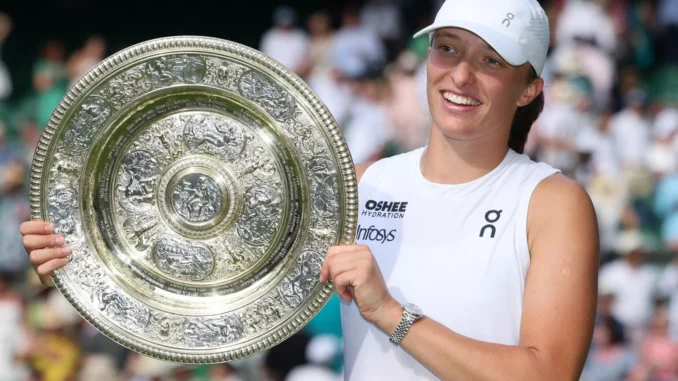
Iga Swiatek, the Polish tennis sensation, has left an indelible mark on the 2025 Wimbledon Championships, capturing her first title at the All England Club with a breathtaking 6-0, 6-0 victory over Amanda Anisimova in just 57 minutes. The 24-year-old’s sixth Grand Slam triumph, which made her the first Polish woman to win Wimbledon, was a historic moment, marking only the second time in the Open Era that a Grand Slam final ended in a double bagel. Following this commanding performance, Swiatek took to Instagram to share an emotional statement, reflecting on a victory that felt “surreal” and capped a challenging year. Her words, filled with gratitude and disbelief, offer a window into the resilience and heart of a champion who has now conquered all three major surfaces—clay, hard, and grass.
Swiatek’s journey to Wimbledon glory was anything but straightforward. After dominating the WTA Tour as world No. 1 for 125 weeks, her 2025 season was marred by setbacks, including a one-month doping suspension in 2024 due to a contaminated sleeping pill, which she described as a time when her “career was hanging by a thread.” The emotional toll was profound—she admitted to “three weeks crying daily” and struggling to step onto the court. A semifinal loss to Aryna Sabalenka at the 2025 French Open, her first failure to reach the Roland Garros final since 2021, coupled with a 15-tournament title drought, saw her ranking slip to No. 8. Yet, Wimbledon became her redemption. “WHAT? I just can’t wrap my mind around it yet,” she wrote on Instagram, capturing the disbelief of achieving a dream she once thought “too far away.”
The final against Anisimova was a masterclass in precision and mental fortitude. Swiatek, seeded eighth, broke her opponent’s serve in the opening game and never relented, landing 78% of her first serves and committing just 11 unforced errors. Her relentless returning and supreme defensive skills overwhelmed Anisimova, who, despite a stellar run that included a victory over world No. 1 Sabalenka, couldn’t find her rhythm. “I didn’t even dream about this because it felt too far away,” Swiatek told the Centre Court crowd, clutching the Venus Rosewater Dish. “I feel like I’m an experienced player after winning slams before, but I never really expected this one.” Her Instagram post echoed this sentiment, thanking her team, particularly coach Wim Fissette, who joined her late in 2024 and helped transform her grass-court game. “My team believed in me more than I did,” she said, crediting their faith for her success.
Swiatek’s adaptation to grass, a surface where she had never advanced past the quarterfinals as a professional, was remarkable. Working with Fissette, she refined her movement and embraced a riskier, more aggressive style, moving away from her clay-court comfort zone. “I think I moved better, served better, returned better,” she said, noting the importance of the first few shots on grass. Her 100th career Grand Slam match win, achieved in the final, placed her among legends like Margaret Court and Monica Seles as the only women to win their first six major finals in the Open Era. “I’m just proud of myself because, yeah, who would have expected that?” she reflected, emphasizing the surreal nature of her triumph after a season of “ups and downs and a lot of expectations from the outside.”
The emotional weight of the victory was palpable. After collapsing to the grass in disbelief, Swiatek shared tearful embraces with her father, Tomasz, a former Olympic rower, and her sister, Agata, in a moment that resonated with fans worldwide. “My mom has sacrificed so much,” she told reporters, her voice thick with emotion. “That was why I was getting so emotional. I’m a very lucky daughter to have her in my life.” Her post-match interaction with Martina Navratilova, who pointed to Swiatek’s name on the Honour Board, was a poignant highlight, symbolizing her entry into tennis’s pantheon. Social media erupted with praise from peers like Coco Gauff, who wrote that Anisimova had “so much to be proud of,” and Polish soccer star Robert Lewandowski, who called her “amazing.”
Swiatek also addressed her critics, particularly in Poland, where media scrutiny had intensified after her doping case and perceived emotional outbursts, like an incident at Indian Wells where she nearly hit a ball boy. “I hope they’ll just leave me alone now,” she said, frustrated by being labeled a “robot” when focused and “immature” when expressive. Her Instagram post was a plea for understanding: “I am an emotional person, inside I feel much more than I show outside, I knew in this tournament I had to be brave.” As she heads to the US Open, where she won in 2022, Swiatek’s Wimbledon triumph—a “magical” moment, as she called it—signals a return to her dominant best, ready to silence doubters on the hard courts.
Leave a Reply